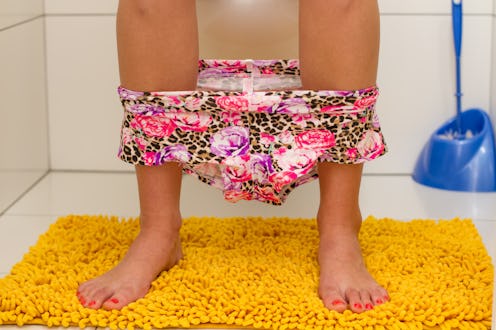Life
5 Things That Happen When You Use Laxatives

Out of all the over-the-counter medications at the pharmacy that have potentially dangerous side effects, laxatives might be the easiest ones to get your hands on. Usually, when we hear about laxatives being misused, it's within the context of women struggling with eating disorders and using them as a method of purging. In 2014, it was reported in the United Kingdom that 80 percent of people with an eating disorder have used laxatives at some point in an attempt to lose weight. But even if you're not using them to lose weight, laxatives can be bad for you.
Abusing laxatives as part of an unhealthy diet scheme is what garners the most attention, but there are plenty of people out there who use laxatives for reasons unrelated to mental illness. Maybe they're just constipated and can't handle the discomfort anymore. Whatever the case is, they might not even know what happens in the body after they take laxatives, and not being equipped with this knowledge can be just as hazardous as if you're misusing them.
Whether you're the kind of person who uses laxatives every once in a while or is considering using them in the near future because you simply can't get a poop out, make sure you read through all the information so you and your colon know what you're about to get yourselves into. And as always, when in doubt, call up your trusty doctor.
Here are five things that happen to your body when you use laxatives.
1. Your Abdomen Bloats
Bloating is a side effect for pretty much every kind of over-the-counter laxative you can get your hands on. Some laxatives draw water into your colon from the rest of the body so stool passes easier; others do that while also triggering rhythmic contractions of the intestinal muscles to allow passage.
These kinds of movement in your abdominal region cause your belly to bloat — until you make it to the toilet bowl, anyway. Your tummy might even be hard to the touch, making it very uncomfortable to wear an everyday pair of jeans.
2. Your Stomach Cramps Up & You Get Gassy
These are common side effects that aren't considered very severe, and they're expected to happen no matter what kind of laxative you take. As soon as you take the medicine, your system goes into overdrive to expel however much stool you've got stuck in there. All that hard work causes a stomachache, complete with loud rumbling sounds.
You'll also feel the gurgling that generally precedes flatulence. Feeling particularly gassy in the time period between when you take the laxatives and when you visit the bathroom is normal. Just make sure you can distinguish between a fart and, well, something else.
3. The Level Of Electrolytes In Your System Changes
When laxatives draw water into your bowel from the surrounding tissue, they tend to absorb a lot of the nutrients along with it that don't really want to be disrupted in the first place. This causes an imbalance of electrolytes in your body, including calcium, potassium, magnesium, sodium, and chloride.
You might become really thirsty or experience dry mouth. Extended use of laxatives can mess with your electrolyte levels so much that you become dehydrated. If you start to notice any signs of dehydration — dry mouth, headache, not being able to pee — stop taking the laxatives and speak with a doctor immediately.
4. Your Risk For Kidney Injury Increases
On January 8, 2014, the FDA released an official warning about the dangers of sodium phosphate laxatives after 13 people died as a result of using them incorrectly. Taken either orally or anally, these particular laxatives are particularly dangerous for people who are already taking kidney medication or have kidney disease. The warning noted that signs of kidney complications include not urinating enough, drowsiness, and swelling of the feet and ankles.
Of course, the individuals who died after taking these laxatives didn't follow the directions on the box. They took more doses in a single day than was instructed. If you do this and don't have a bowel movement within 30 minutes (if it's consumed rectally), you need to seek medical attention.
Even if you don't have suffer from any kind of preexisting kidney issues, it's better to air on the side of caution. Kidney disease kills about two percent of women today, and there are no symptoms in the early stages that indicate its existence. So if you're going to mess around with laxatives, you better go with the right dosage.
5. Your Colon Can Lose Its Ability To Naturally Contract
An unpleasant thought, I know. Remember those rhythmic contractions we talked about earlier that laxatives put your intestines through? Well, your colon is supposed to do that on its own. The muscles expand and contract, absorbing nutrients from the food and preparing to expel what the body doesn't need. If you're experiencing irregularity with your bowel movements, these movements probably aren't happening as easily as they normally would, though.
That's where the laxatives come in. They induce rhythmic movements in your colon, leaving the stool no choice but to exit the body. This is OK every once in a while, but if you become dependent on laxatives to poop, your colon might forget how to do these contractions on its own. No good.
Before you reach for laxatives, consider all the other natural things you can consume to address your constipation, such as beans, pears, figs, and of course, water. Speak with your doctor about any other measures you can possibly take to prevent getting stopped up, because, let's face it, not much good comes out of using laxatives on a regular basis.
Want more women's health coverage? Check out Bustle's new podcast, Honestly Though, which tackles all the questions you're afraid to ask.
Images: Fotolia; Giphy (5)